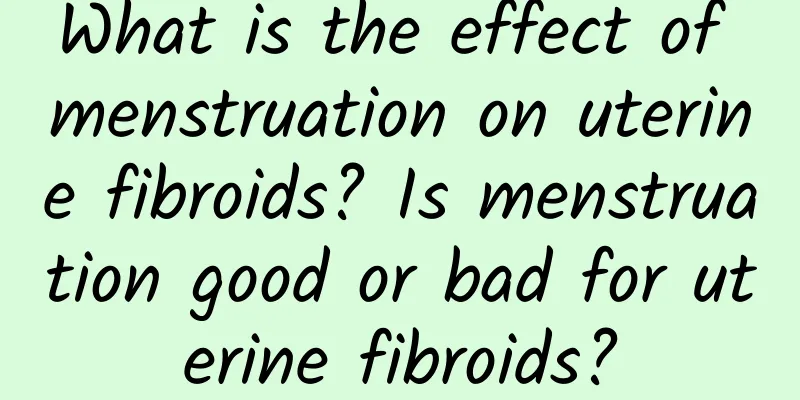Why does uterine fibroids grow during cesarean section? Is uterine fibroids more likely to develop during cesarean section?

|
Why does a cesarean section cause uterine fibroids? Is a cesarean section more likely to cause uterine fibroids? Caesarean section is an emergency way of childbirth, but in recent years, some studies have found a certain correlation between caesarean section and uterine fibroids. So why does uterine fibroids grow after caesarean section? Does caesarean section easily lead to the occurrence of uterine fibroids? Let's explore this question together. text: 1. Hormone changes After a cesarean section, a series of hormonal changes occur in the uterine lining in order to restore the normal function of the uterus. However, this hormonal change can sometimes lead to the growth of uterine fibroids. Due to the surgical interference of the cesarean section, the metabolism and hormone balance of the uterus may be altered, leading to the abnormal proliferation of fibroid cells. 2. Post-traumatic repair Caesarean section is a surgery that directly enters the uterus after cutting open the abdominal wall. This process is a major trauma to the mother. The repair process after the trauma may stimulate and promote the growth of fibroids. In addition, the uterine wall may be cut during the cesarean section, causing damage, which also provides a basis for the development of fibroids. 3. Genetic factors Caesarean section is undoubtedly an intervention method. The environment of the mother's uterus will change, which also provides an environment for the genetic factors of fibroids. Some studies have found that fibroids have a certain degree of genetic tendency. Caesarean section may stimulate or accelerate these existing genetic factors, thus leading to the appearance of fibroids. The above are some reasons why uterine fibroids may develop after a cesarean section. However, not every woman who has a cesarean section will develop fibroids, and the probability of occurrence is low. Cesarean section is a method used to protect the lives of mothers and babies. When faced with serious obstetric problems, cesarean section is still an important choice. Although there is a certain correlation between cesarean section and uterine fibroids, this does not mean that every woman who undergoes a cesarean section will develop uterine fibroids. Therefore, it is very important to choose the best method of delivery based on the specific condition. At the same time, in addition to cesarean section, there are other factors that may cause the occurrence of uterine fibroids, such as genetics, hormone imbalance and lifestyle habits, etc. Therefore, cesarean section is not the only cause of uterine fibroids. Why does uterine fibroids grow after a cesarean section? There may be many unsolved mysteries about this question, which requires further research and observation. The occurrence of uterine fibroids after cesarean section may be related to many reasons such as hormonal changes, post-traumatic repair and genetic factors. However, although there is a certain correlation, not every woman who has a cesarean section will develop uterine fibroids. For women who are about to have a cesarean section or have already had a cesarean section, it is very important to understand the relevant knowledge and communicate with the doctor. |
>>: What department should I go to for B-ultrasound of uterine fibroids?
Recommend
What are the symptoms of pelvic inflammatory disease?
Pelvic inflammatory disease is a common gynecolog...
What is the cure rate for Bartholinitis?
We all know that the occurrence of Bartholinitis ...
How to treat vulvar itching accompanied by mild leucorrhea?
How to treat vulvar itching accompanied by mild l...
Obesity caused by excess fat! 3 Teas with Warming Ingredients
"Doctor, why does my face look swollen, and ...
Treating vaginitis requires a certain method
Vaginitis is a common disease in life. If you don...
Introduction: Early symptoms of different types of vaginitis
Clinically, the early symptoms of different types...
How to do dietary care for miscarriage
Life always plays jokes on us. Sometimes we want ...
The muscle lines of the whole body are very beautiful when rock climbing! Practice rock climbing and diving, Chen Yu has a perfect figure
Is it because he loves sports, or is he just hype...
What causes congenital absence of vagina in women?
What is the cause of congenital absence of vagina...
What are the dietary principles for pelvic effusion?
Pelvic effusion is a common gynecological disease...
How uterine fibroids are caused
What causes uterine fibroids? Uterine fibroids ar...
Why does uterine fibroids cause low blood pressure and dizziness? Does uterine fibroids cause high blood pressure?
Why does uterine fibroids cause low blood pressur...
What causes ovarian cysts and how to treat them
Ovarian cysts may be caused by functional cysts, ...
What to eat after miscarriage
Generally speaking, artificial abortion refers to...
Can ovarian cysts heal on their own? What are the symptoms?
Will an ovarian cyst heal on its own? What are th...









